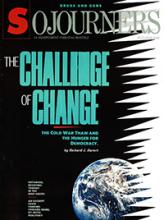THE PHONE CALL CAME DURING HOLY week. A timid, young voice on the other end of the line stated simply, "My mother said you could help me." When Nicole finally introduced herself, I knew that a five-month search was over.
I had met her mother at the Women's Federal Correctional Institution in Alderson, West Virginia, while I was on an assignment there for Sojourners. In our first conversation, Celia talked mostly about her oldest daughter. "Promise me you'll find Nicole when you get back," she pleaded as I left the prison. For weeks I tried to keep my promise to her. Phone calls to social workers and foster parents back in Washington, D.C., only revealed that Nicole had disappeared without letting anyone know her whereabouts.
I received letters from Celia and returned to Alderson to visit her. Slowly, over time, she offered me the pieces of her story. Terrified to think of having to make it on her own with four children, Celia had stayed for 13 years with a husband who beat her. In recent months he had begun to abuse the children, so she took them and fled to a friend's home.
Her husband became enraged and threatened to hurt each of the children, beginning with the oldest, unless Celia came back to talk things over. On a Sunday morning, while Nicole was walking to church, her father and two of his buddies waited on a street corner and then gang-raped her. Nicole was 14.
The husband threatened similar violence against the next daughter, so Celia went to the house to talk to him. One of the men who had participated in the rape was downstairs in the house while Celia and her husband talked upstairs. A cousin of Nicole's, having heard about the rape, arrived with a gun and shot the man. By the time the police arrived, the man was dead and Celia was in the room, having run downstairs with her husband when they heard the shot.
Read the Full Article

